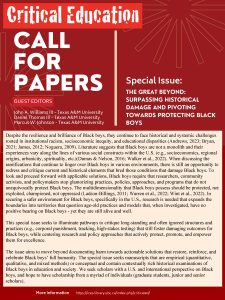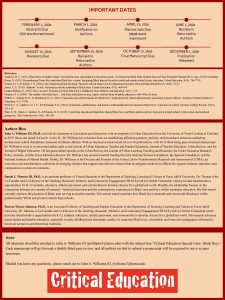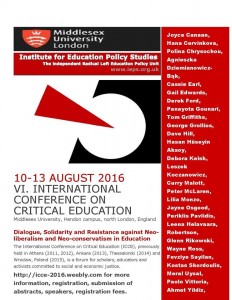Guest Editors:
John A. Williams III – Texas A&M University
Daniel Thomas III – Texas A&M University
Marcus W. Johnson – Texas A&M University
Despite the resilience and brilliance of Black boys, they continue to face historical and systemic challenges rooted in institutional racism, socioeconomic inequity, and educational disparities (Andrews, 2023; Bryan, 2021; James, 2012; Noguera, 2009). Literature suggests that Black boys are not a monolith and their experiences vary along the lines of various social constructs within the U.S. (e.g., socioeconomics, regional origins, urbanicity, spirituality, etc.) (Dumas & Nelson, 2016; Walker et al., 2022). When discussing the ramifications that continue to linger over Black boys in various environments, there is still an opportunity to redress and critique current and historical elements that bred those conditions that damage Black boys. To look and proceed forward with applicable solutions, Black boys require that researchers, community activists, and policymakers stop glamorizing practices, policies, approaches, and programs that do not unequivocally protect Black boys. The multidimensionality that Black boys possess should be protected, not exploited, championed, not oppressed (Ladson-Billings, 2011; Warren et al., 2022; Wint et al., 2022). In securing a safer environment for Black boys, specifically in the U.S., research is needed that expands the boundaries into territories that question age-old practices and models that, when investigated, have no positive bearing on Black boys – yet they are still alive and well.
This special issue seeks to illuminate pathways to critique long-standing and often ignored structures and practices (e.g., corporal punishment, tracking, high-stakes testing) that still foster damaging outcomes for Black boys, while centering research and policy approaches that actively protect, promote, and empower them for excellence.
The issue aims to move beyond documenting harm towards actionable solutions that restore, reinforce, and celebrate Black boys’ full humanity. The special issue seeks manuscripts that are empirical (quantitative, qualitative, and mixed methods) or conceptual and contain contextually rich historical examinations of Black boys in education and society. We seek scholars with a U.S. and international perspective on Black boys and hope to have scholarship from a myriad of individuals (graduate students, junior and senior scholars).
All abstracts should be emailed to John A. Williams III (jwilliams3@tamu.edu) with the subject line “Critical Education Special Issue: Black Boys.” Abstracts due: February 1, 2016.
Each manuscript will go through a double blind peer review, and all authors invited to submit a manuscript will be required to serve as peer reviewers.
Should you have any questions, please reach out to John A. Williams III, jwilliams3@tamu.edu.
References
Andrews, D. C. (2023). Black boys in middle school: Toward first-class citizenship in a first-class society. In Advancing Black Male Student Success from Preschool Through Ph.D. (pp. 45-60). Routledge.
Bryan, N. (2021). Remembering Tamir Rice and other Black boy victims: Imagining Black playcrit literacies inside and outside urban literacy education. Urban Education, 56(5), 744-7710.
Dumas, M. J., & Nelson, J. D. (2016). (Re) Imagining Black boyhood: Toward a critical framework for educational research. Harvard Educational Review, 86(1), 27-47.
James, C. E. (2012). Students “at risk” stereotypes and the schooling of Black boys. Urban Education, 47(2), 464-494.
Ladson Billings, G. (2011). Boyz to men? Teaching to restore Black boys’ childhood. Race ethnicity and education, 14(1), 7-15.
Noguera, P. A. (2009). The trouble with black boys:… And other reflections on race, equity, and the future of public education. John Wiley & Sons.
Walker, L., Goings, R. B., & Henderson, D. X. (2022). Unpacking race-related trauma for Black boys: Implications for school administrators and school resource officers. Journal of Trauma Studies in Education, 1(3), 74-89.
Warren, C. A., Andrews, D. J. C., & Flennaugh, T. K. (2022). Connection, antiblackness, and positive relationships that (re) humanize Black boys’ experience of school. Teachers College Record, 124(1),111-142.
Wint, K. M., Opara, I., Gordon, R., & Brooms, D. R. (2022). Countering educational disparities among Black boys and Black adolescent boys from pre-k to high school: A life course-intersectional perspective. The Urban Review, 54(2), 183-206.



 Follow
Follow




